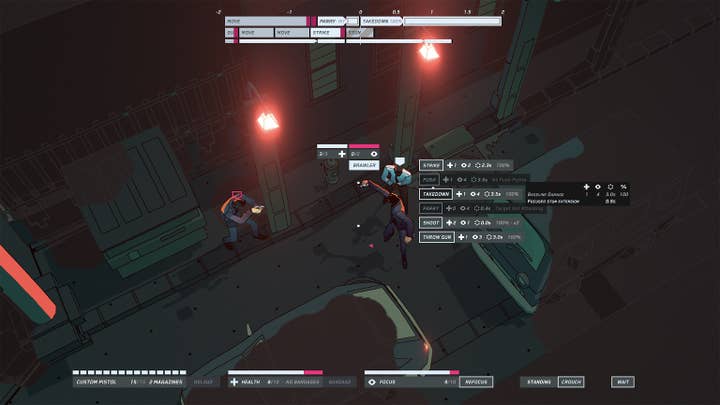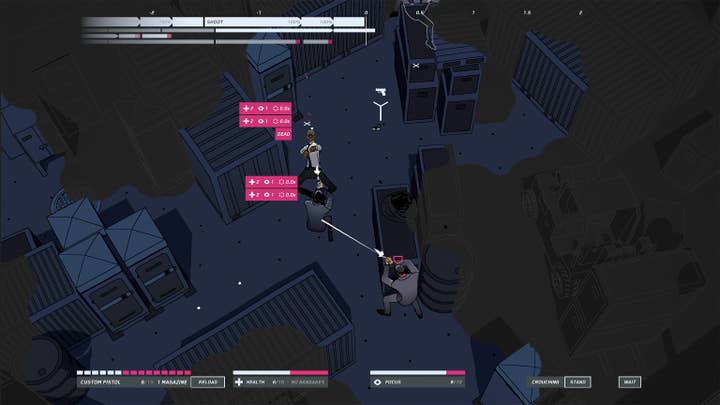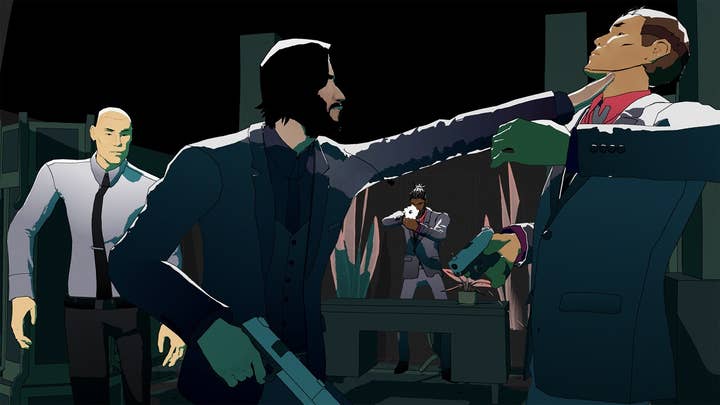Making the most interesting licensed games through self-sabotage
John Wick Hex director and writer Mike Bithell shares his strategy for finding good partners to make interesting licensed projects
John Wick Hex takes its name from the game's hexagonal playfield, but for developer Mike Bithell, the project's key shape may be more of a full circle.
Bithell's first job in the industry was at Blitz Games Studios in the late 2000s. While there, he worked as a junior designer on a licensed console game, Tak and the Guardians of Gross. Speaking with GamesIndustry.biz at E3, he does not describe it as an ideal experience.
"We had seven months to make a game that was -- and the pitch literally said this -- Prince of Persia: Sands of Time meets God of War," Bithell says. "In seven months. And you know what, we got closer to that line than you would expect. But it was the best we could do in the time. So I experienced what licensed games used to be."
Clearly, the experience was not to his liking. But after going indie and landing a hit with Thomas Was Alone, he began to be approached by brand-holders interested in having him to work on their properties. While Bithell is an unabashed fan of certain properties, he didn't want a repeat of his previous experience in licensed work, so he adopted a way to screen out deals that would be likely to lead to that.
"Our policy has always been to pitch what we think is the most interesting version of that and not the easy one"
"If it's something we are interested in, our policy has always been to pitch what we think is the most interesting version of that and not the easy one," Bithell says. "And it's honestly actively self-sabotaging to pitch the one that no one would ever agree to so either we don't have to do a boring licensed game we're not going to enjoy making, or if someone were ever to say yes, we'll actually be able to make something very cool. That strategy is something we've done for years, and has always been very successful in turning away licensed work."
Bithell says that representatives of one big franchise he had discussions with responded to his pitch with an email consisting entirely of "lol."
Then came Lionsgate, who wanted to hear Bithell's idea for a John Wick game. He figured a 3D action game was the straightforward way to adapt the hyperviolent, hyperkinetic film franchise about a legendary hitman, so instead he proposed a turn-based strategy game.

"Lionsgate, for whatever reason, was like, 'Oh that's a cool idea. That's very interesting.' And I think it's because they wanted to make something that was surprising, something that was a bit unique with the John Wick franchise."
Even so, Bithell went into the project assuming the worst.
"I had to learn how to collaborate rather than just doing it how it used to be," Bithell says, "where you'd get the brand guidelines .doc, like 200 pages, then you go through that, submit your milestones, and get pages back of like, 'Bob has to have shorter hair,' 'We don't think this is right,' 'This actor is very, very uncomfortable with the size of their ears. Please make the character model's ears much smaller.' I'm changing lots of things about that story, but I have had that email on stuff back in the day."
That's not to say Lionsgate has been hands-off. The studio did suggest some changes, like moving away from a purely turn-based system to better reflect the fluid action of the films. Now the game uses a stop-and-start mechanic that gives players time to deeply consider all of their moves but then playing them out simultaneously alongside AI actions using a clever video-editing timeline system atop the screen. Bithell refers to it as "basically Fight Choreography: The Game."
"What has changed, and this is due to the Marvel Universe thing, is people aren't as necessarily fussed about everything hitting on the movie's release date"
Lionsgate has also helped with access to some of the franchise's key talent, like the director and fight choreographers, people whose knowledge and experience he wouldn't be able to incorporate otherwise. As a result, Bithell says the game itself is not only more marketable than it would be without the license, but also demonstrably better as a game.
"If we said let's make a strategy game like John Wick but not John Wick and then spent a year making that game, it would be a worse game than that," Bithell says. "It would be turn-based. It would be made without the intimate understanding of how fight coordination works and those things. We're making a better game because of the license."
Part of that speaks to the ways licensors have changed their strategies when it comes to games over the years. Bithell says they're more savvy about how to collaborate effectively with developers than when he worked on Tak and the Guardians of Gross.
"What has changed, and this is due to the Marvel Universe thing, is people aren't as necessarily fussed about everything hitting on the movie's release date," Bithell says. "Entertainment companies aren't looking to make a splash on one week anymore; they're looking to make something you want to subscribe to on a monthly rate. Everyone's trying to build these rolling service-y entertainment products. So yeah, John Wick Hex fills a gap. It comes out somewhere in the space between these two movies, and if you're a John Wick fan who's a gamer, you get a John Wick beat. But that's the same with Fortnite skins, comic books, the TV show they've announced, whatever else they do with it."

John Wick Hex was announced a week before John Wick 3 arrived in theaters, so studios clearly aren't oblivious to the potential of tie-ins and marketing synergy. But brand strategies are often larger in scope now, and a product keeping the brand front-of-mind for consumers has some value no matter when it launches. For example, Bithell says there's no mandate to launch alongside the already announced fourth John Wick film.
"I could see us doing more licensed stuff as long as it continues to be interesting, as long as it continues to be these kind of collaborations"
"There's very much a 'when we're done' mentality to this," Bithell says. "It's been learned by Hollywood and by the games industry that you do not set a date based on a film's release date because that doesn't work, primarily because films are a lot quicker to make than games."
He adds this approach makes more sense for studios and brand-holders. Since shameless cash-ins can tarnish a brand, they should be incentivized to release quality products whenever they happen to be ready rather than whenever would create the most cross-promotional opportunities.
John Wick Hex isn't done yet, but Bithell's attitude toward licensed games seems to have softened a bit. When I ask him if he'd be willing to jump straight to another licensed project after this or would prefer to work on something original, he hesitates.
"From the day you sign a project, you're trying to think about what you might do next," Bithell says. "But I could genuinely see it go either way is the honest answer. I'm having a good time with this and I could see us doing more licensed stuff as long as it continues to be interesting, as long as it continues to be these kind of collaborations. Because it does open doors."
He leaves some clues as to what could bring him back to licensed work in a hurry, saying with very little prompting, "I tweeted today about Marvel. I try to do it every day if I can."
From our research, "every day" is an exaggeration, but the general sentiment checks out.

